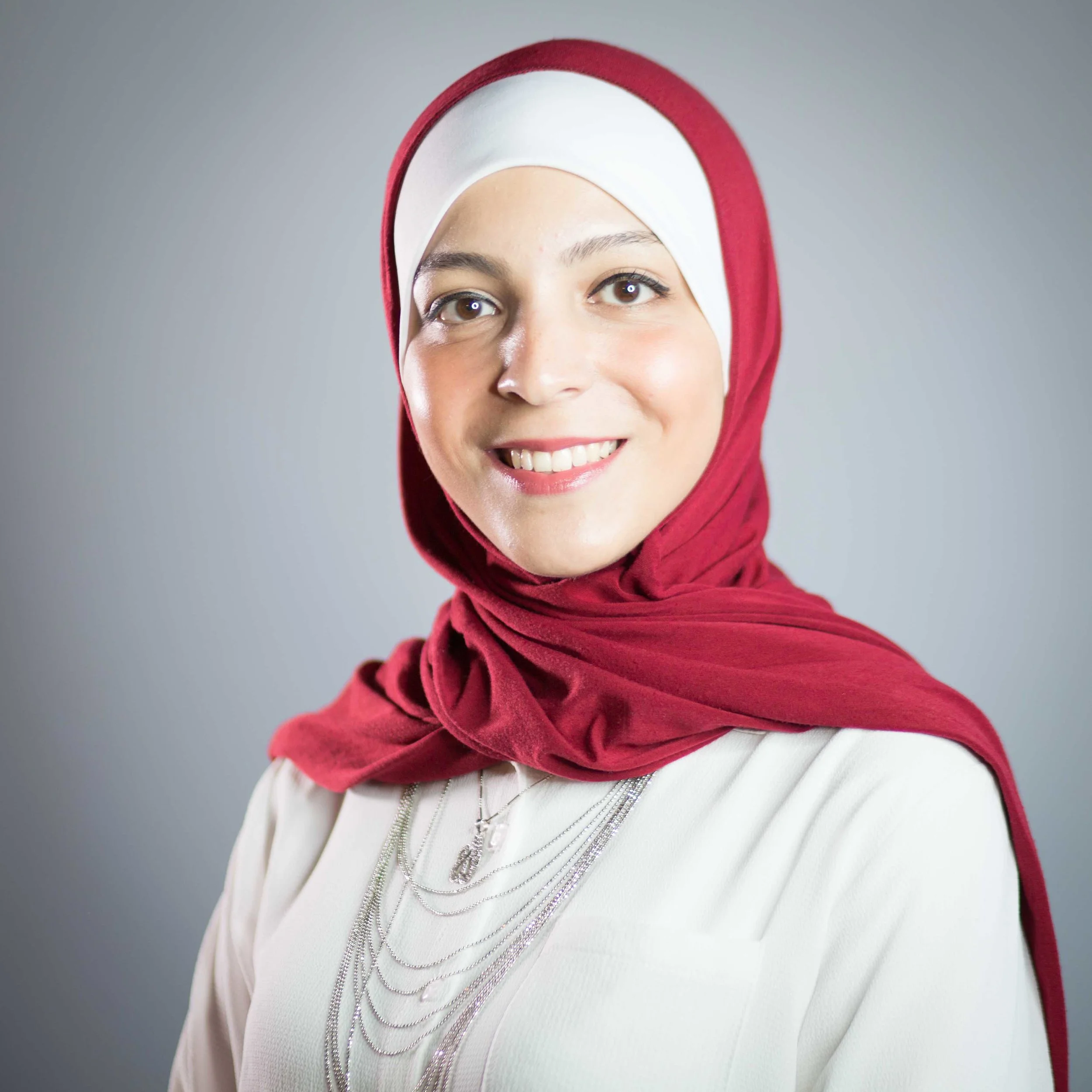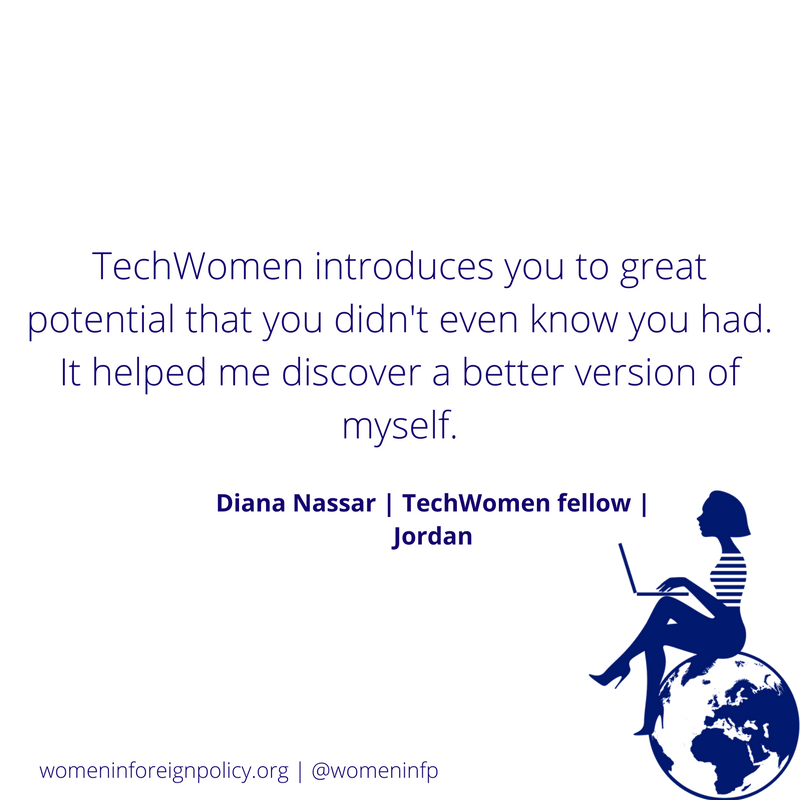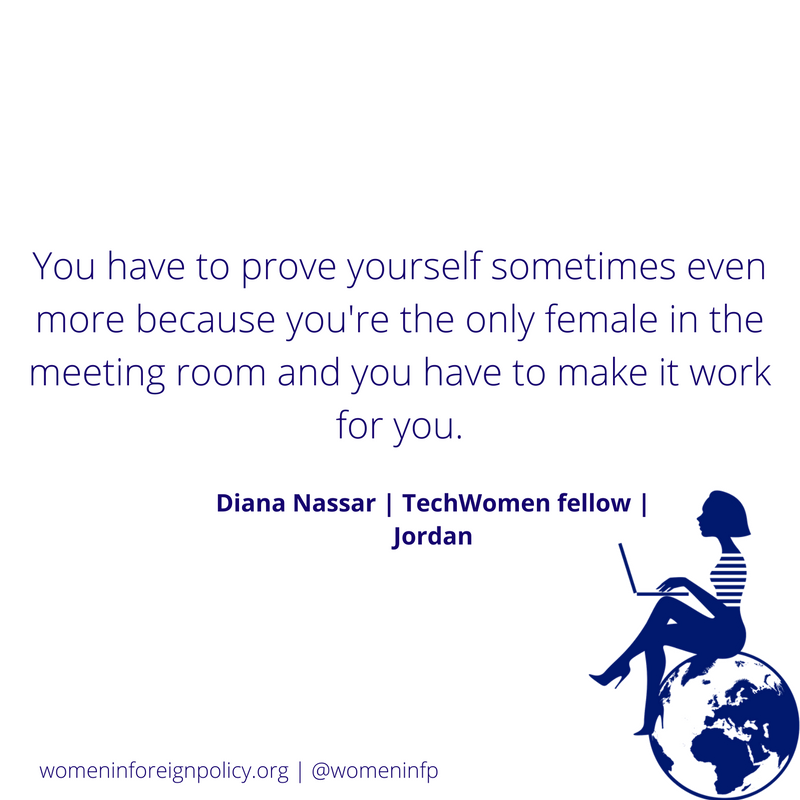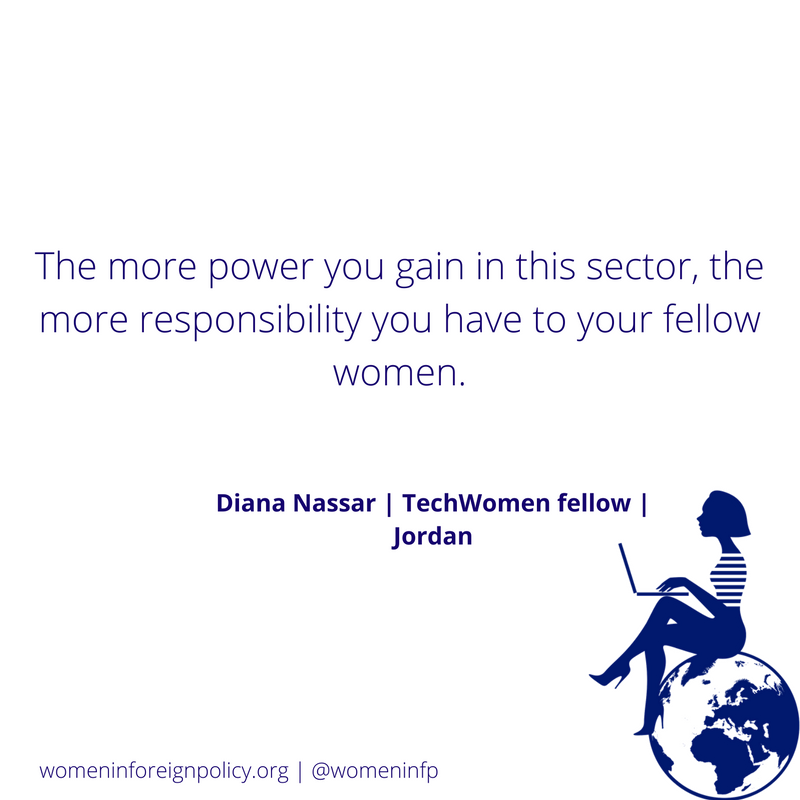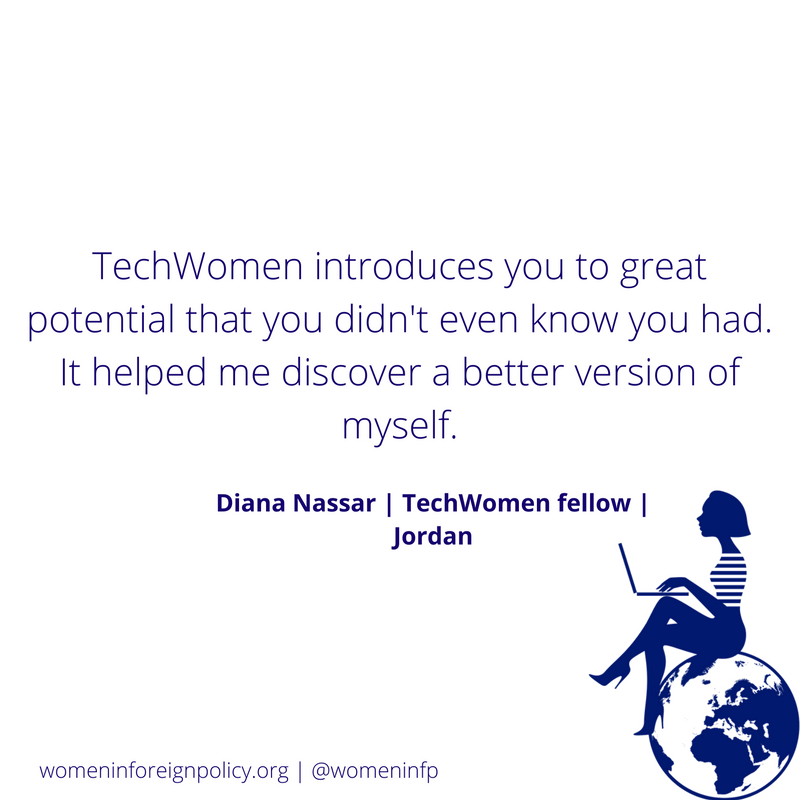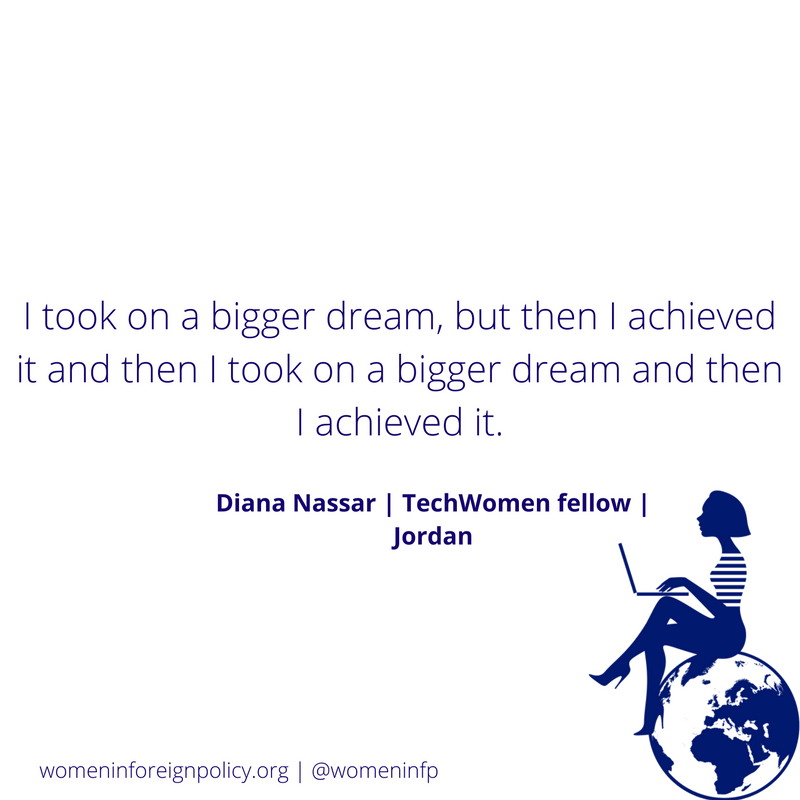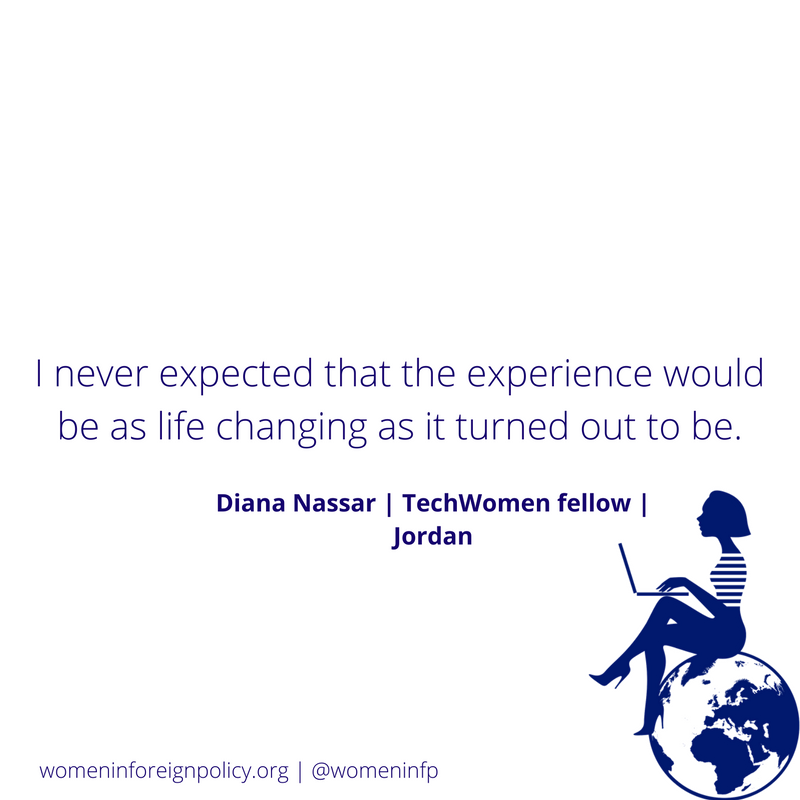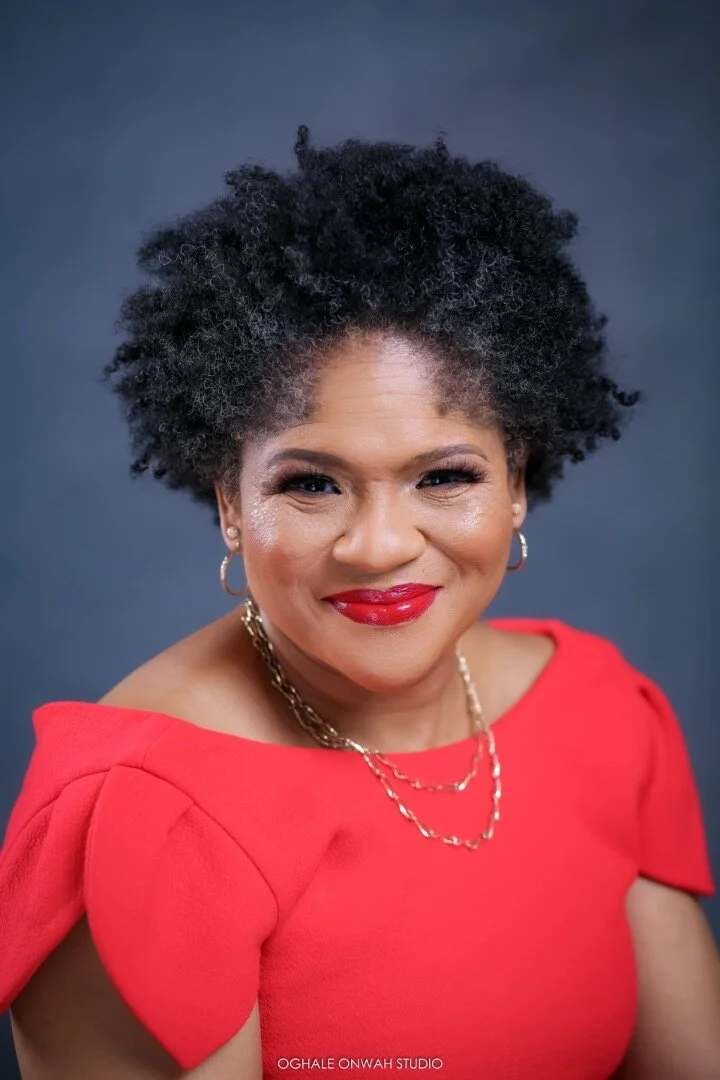Diana Nassar
/TechWomen Fellow | Jordan
CV in brief:
🎓 Education: BSc in Computer Engineering at Al-Jami'ah Al-Urdunia (Jordan)
💻 Follow Diana online: Personal website | Twitter | Facebook | LinkedIn | YouTube
🗣 Exclusive interview by Lucie Goulet and Kelsey Suemnicht, 5 December 2016
A TechWoman from the Middle East: Diana Nassar at The Women in Diplomacy Podcast
This interview is part of an ongoing partnership between Women in Foreign Policy and The Women in Diplomacy Podcast, ran by Kelsey Suemnicht, focused on women working at the intersections of foreign policy and technology.
Previous interviews include:
- Kelsey Suemnicht, founder, The Foreign Policy Project
- Arezoo Riahi, Program director, TechWomen
- Katie Shay, Legal Counsel, Business and Human Rights, Yahoo!
- Irene Wu, Expert in communication technology around the world
- Wendy Betts, Director, eyeWitness to Atrocities
- Nora Hauptmann, Head of NGO Relations, Kiron Open Higher Education
Can you tell us a little bit about yourself?
I work as a Product Manager at an e-commerce company called Souq.com. I'm based in Amman, Jordan. I'm also a 2016 TechWomen Fellow.
Let's talk about your TechWomen experience, how did you join the program?
TechWomen is an initiative by the U.S. Department of State. It opens up its application process around November or December. You can apply directly to their website. I had to write essay questions and talk about my experience and what I do.
After that, I got shortlisted and was interviewed by the Embassy. I was one of 87 women selected for the 2016 Edition. We were chosen out of more than 2,300 applicants.
That sounds like a rigorous application process. How did you feel about participating?
I never expected that the experience would be as life changing as it turned out to be. I thought it might be just another exchange program that you participate in and youget to know cool folks and the culture of the country you're in.
TechWomen is a life-changing experience for any woman who works in STEM because it exposes you to Silicon Valley. It introduces you to great potential that you didn't even know you had. It helped me discover a better version of myself.
Do you have any plans with what you can concretely do with what you've learnt in the program?
Many people think that exchange programs such as TechWomen are only beneficial for the people participating in them. TechWomen is different because the organisers urge us to come up with an action plan to serve our community and our country, once we're back.
In my case, for Jordan, the action plan that we worked on focused on increasing the percentage of women who are employed. We are connecting them with work-from-home platforms, so that they can work remotely on their own projects and not have to choose between family and work.
Can you share with us your journey as a woman in STEM in the Middle East?
It all started when I developed my first personal website, aged 14. It was a school task and it was very simple. Then I started to see the magic of technology and loved how you can code something tangible. This is when I started to develop my interest in technology. It was about the same time that technology became a big player in this world. I began to see the difference that it was making in people's lives and in communities. That's when I decided that I wanted to study Computer Engineering at school and I wanted to have technology as a career.
I started off as a Software Engineer at Aramex International, but two and a half years down the road, I realized writing code wasn’t enough for me. I had more to offer. I wanted to interact with people. That's when I decided to move into product management, to take more of a strategic approach towards technology.
There's a lot of discussion about how STEM can be a sexist sector, and how we need more women in it. What is your experience of it?
That's very true and very sad. It saddens me on a personal level, because so many girls from my class are now married and are not using the skills that they acquired. It’s a personal decision, but sometimes I feel that it's more society than the individual deciding as it's what society forces them to do. Most of the time girls, especially in my community, feel like they have to choose between their work and their personal life, between their family commitments and everything around that.
What I like with technology is that you can always find a solution. You can work from home, you can be a contractor, you can do lots of things if you have these skills.
The main problem here is that girls aren't exposed enough to the opportunities out there. They don't know that that's even an option. I talk to them and they just think that they have to work from 8am to 5pm, which is not feasible for them. We need to raise awareness about remote work opportunities and to support women by having better working conditions, especially in the technology sector. Women are an untouched resource.
What is your advice to women who would like to work in STEM?
A big part of working in STEM is to keep pushing boundaries, because it's a very competitive and sexist place to work. You have to prove yourself sometimes even more because you're the only female in the meeting room and you have to make it work for you. You have to be a very powerful woman, but you also have to be very resilient about things that you face and to never give up.
Remember that the more power you gain in this sector, the more responsibility you have to your fellow women. Keep these issues in your mind and keep speaking up about them. Keep suggesting internship opportunities in your company, keep talking about including more women in your department.
What is your advice to women applying for the TechWomen program?
Highlight how you're different, because it's very competitive. Everyone can have a long career in STEM. You have to highlight what you have done for your community. Highlight how much are you willing to serve and how much have you served. It's always about how much you can benefit your community when you come back. Talk about your work journey and your life journey.
Do you think tech can change the world and where do we get started?
Everyone in Silicon Valley states that they want to make the world a better place, and they claim that technology can do this. It all starts with knowing your limits as we always say that we need to keep pushing boundaries, but we also need to be realistic. Technology can be a factor, it's already helping out but it isn’t the only thing that needs to be done.
Yes, I do believe that it will change the world, because it has done this already. Think about when Egypt was rising and how technology helped people speak up and expose the things that were happening. It is changing our political situation. Technology can change things on so many levels, be it political, be it social, be it socio-economical, but let's be realistic about what it can do.
We want to ask you about the type of frustrating challenges you experience in your working life. Are they recurring problems that you wish you could solve?
Sometimes I feel like we're stuck dealing with third world problems, while some of the challenges that we try to face are more first world problems. You cannot ask people to get an education when they don't even have a computer. You cannot begin by solving the first world problems, you need to solve the third world problems first. The challenges that my region faces go beyond the normal issues of employment rates, poor education... It's more of a political situation and how the whole region is changing. We try to solve the problems that we can solve but we know that there a limits we cannot go beyond.
Do you have any advice for the developed world and the developing world to work together?
I remind myself everyday to never lose hope. The moment we lose hope and stop believing in ourselves, this is all going to be over. We need to keep doing what we're doing and to keep setting an example. Everyone can make a difference.
How can readers and listeners keep in touch with what you're doing and what you're up to?
I have a personal blog, I try to include everything on, it's on DianaNassar.com. I also try to post updates on Facebook and Twitter.
Do you have any closing words of wisdom for young women out there?
The first one is to just dream big. Five years ago, my biggest dream was to work in Dubai, land a job in Jordan, etc. Then, when I got there, I realized: "No, that's not my dream, I can do something better”. So I took on a bigger dream, but then I achieved it and then I took on a bigger dream and then I achieved it. It was as if I realized there was something bigger waiting for me. So just keep pushing your dreams, because the bigger your dreams, the bigger your chances of achieving them.
My second take is to keep in the back of your mind the importance of giving back to your community and to your people. Madeleine Albright says, "There's a special place in hell for a woman who do not help other women." It's not only about giving back with money, you can always give back by sharing your experience, by setting an example, by helping others and empowering them.

